Ritalin for ADHD
Visual Abstract
Effects of methylphenidate on regional brain glucose metabolism in humans: relationship to dopamine D2 receptors
Methylphenidate and Brain Metabolism
Reviewed by Charles Li, MD
July 16, 2024
author
Volkow ND, Wang GJ, Fowler JS, Logan J, Angrist B, Hitzemann R, Lieberman J, Pappas N
journal
Am J Psychiatry
Date Published
1997 Jan
Original
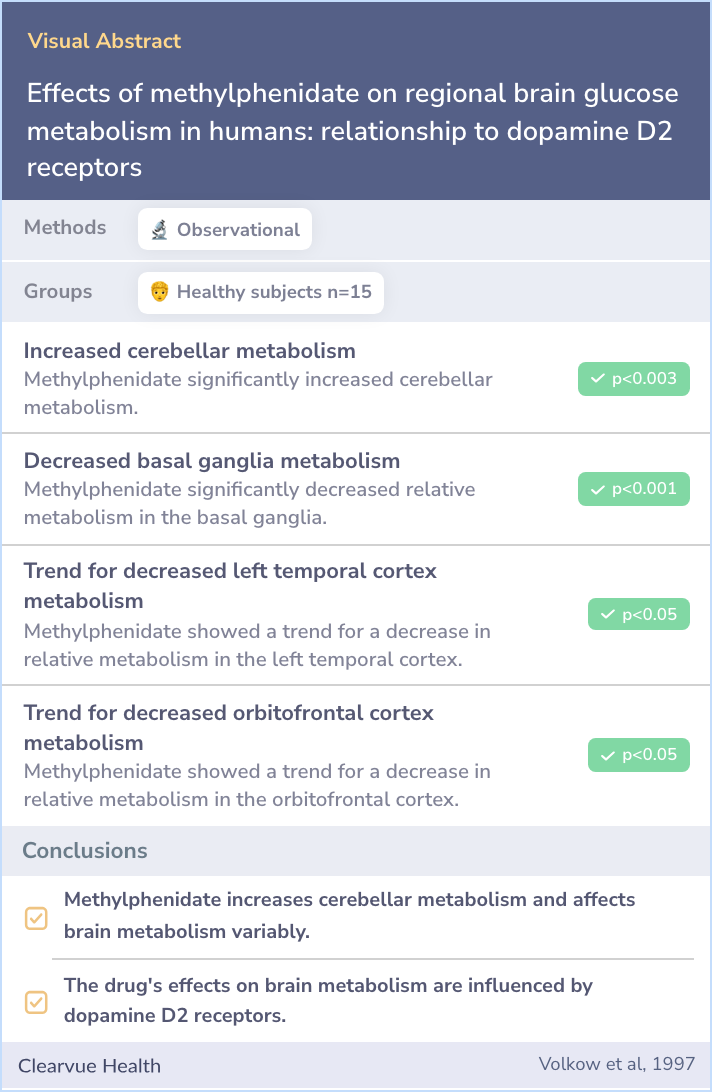
Study Summary
🔬
What They Studied
The researchers wanted to find out if baseline dopamine activity affects how people respond to methylphenidate and to see the brain's metabolic response patterns to increased dopamine activity.
💡
What They Found
They found that methylphenidate increased brain metabolism in some areas and decreased it in others, with consistent increases in the cerebellum.
📚
What This Means
These findings suggest that the effects of methylphenidate on brain metabolism vary among individuals but consistently increase metabolism in the cerebellum. This aligns with current evidence that methylphenidate affects brain activity and dopamine levels.
Study Summary
Background
Abstract: background
The authors' goals were to determine whether baseline dopamine activity contributes to response to methylphenidate and to assess the pattern of metabolic responses associated with enhanced dopamine activity.
🧠
Mechanism of Action
Blocks norepinephrine and dopamine reuptake, increasing their concentration and enhancing brain activity.
🧠
Psychiatric Risks
May worsen symptoms of psychosis or bipolar disorder, underlining the need for careful patient monitoring.
❤️
Cardiovascular Monitoring
Requires monitoring for exacerbation of heart conditions, emphasizing its significant cardiovascular impact.
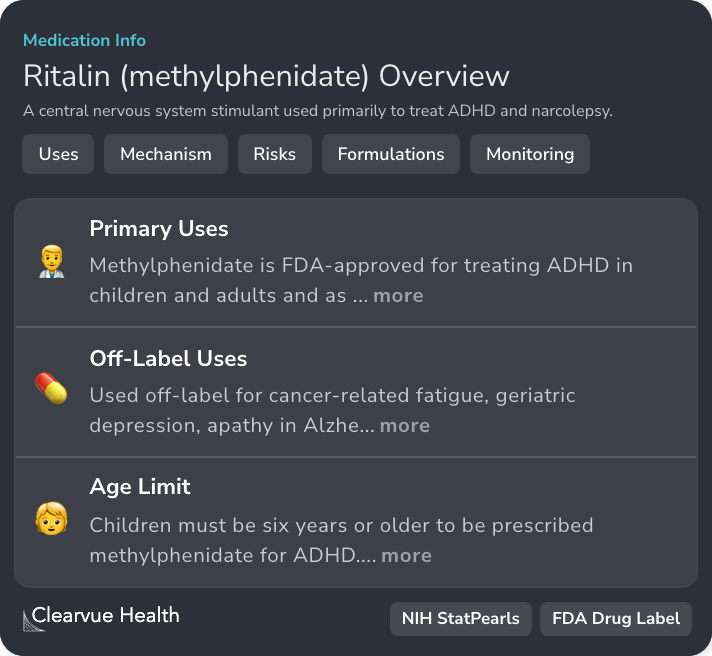
Study Summary
Methods
The study involved 15 healthy participants. Researchers used positron emission tomography (a type of imaging test) with a radioactive sugar compound to observe brain activity after giving the drug methylphenidate. They administered two doses of this drug, one after another. Dopamine D2 receptor levels were also measured using another radioactive substance to see how it related to changes in brain activity caused by the drug.
Abstract: methods
They used positron emission tomography with 2-deoxy-2[18F]fluoro-D-glucose to evaluate the effects of two sequential doses of methylphenidate on brain metabolism in 15 healthy subjects. Dopamine D2 receptor availability was measured with [11C]raclopr...more

Study Summary
Results
Out of the 15 subjects, methylphenidate raised brain metabolism in six, lowered it in two, and had no effect in seven. However, it universally increased metabolism in the cerebellum. The drug significantly boosted relative metabolism in the cerebellum while decreasing it in the basal ganglia. Changes in cerebellum, frontal, and temporal cortex metabolism were strongly linked to D2 receptor availability. Those with higher D2 receptors saw increased frontal and temporal metabolism, while those with lower D2 receptors saw decreases.
Abstract: results
Methylphenidate increased brain metabolism in six subjects, decreased it in two, and did not change it in seven; however, it consistently increased cerebellar metabolism. Methylphenidate significantly increased "relative" (region relative to the whol...more
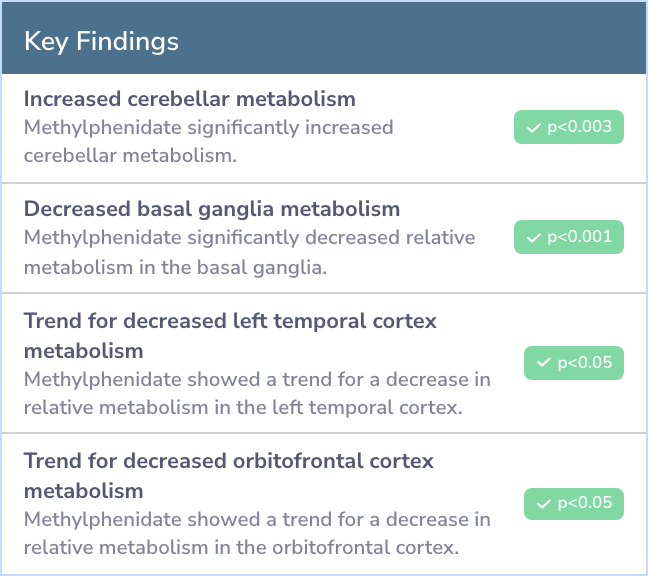
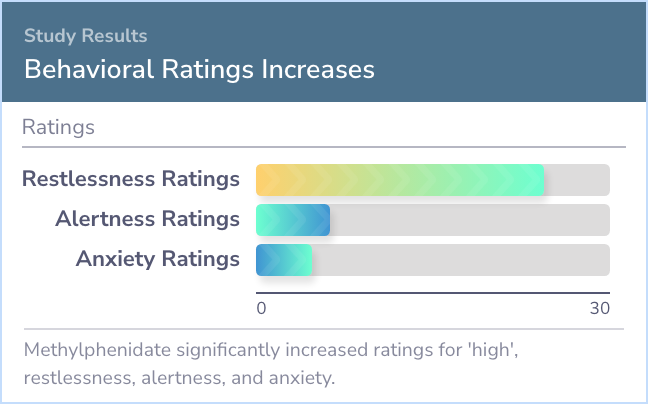
Study Summary
Conclusions
Methylphenidate caused varying changes in brain metabolism but always boosted cerebellar metabolism. It also significantly reduced relative metabolism in the basal ganglia. The relationship between changes in metabolism in the cerebellum, frontal, and temporal cortices with D2 receptors suggests that methylphenidate's impact on brain activity is partly due to dopamine changes. Differences in D2 receptor levels may explain why people respond differently to the drug.
Abstract: conclusions
Methylphenidate induced variable changes in brain metabolism, but it consistently increased cerebellar metabolism. It also induced a significant reduction in relative metabolism in the basal ganglia. The significant association between metabolic chan...more
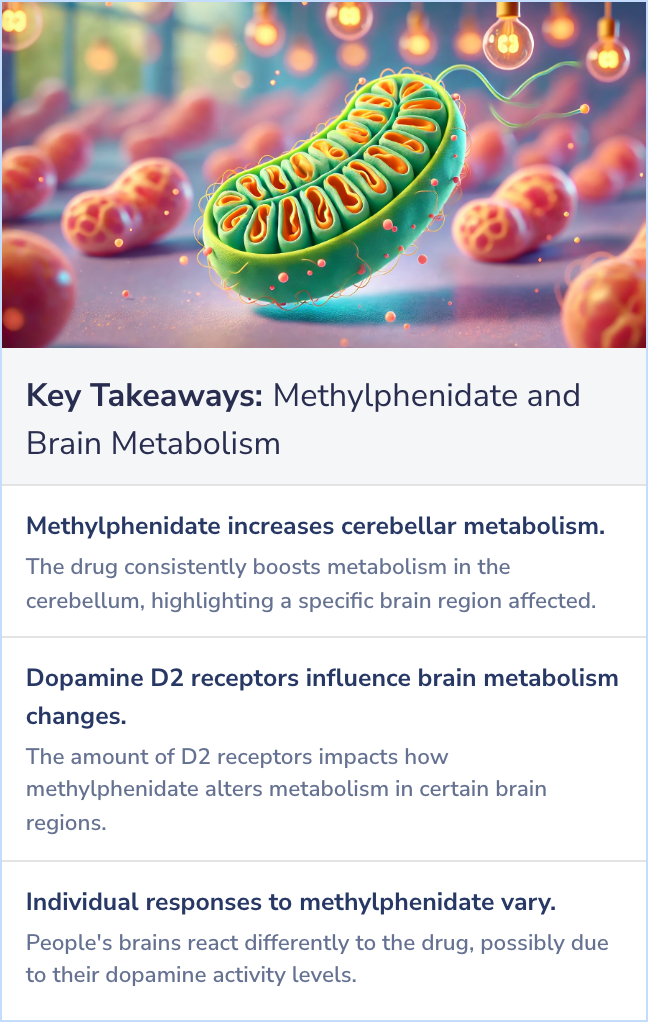
Professional Guide
Expert Opinion: Methylphenidate and Brain Metabolism
The findings suggest that methylphenidate's impact on brain metabolism varies among individuals, which is consistent with the professional guidelines. Current recommendations highlight methylphenidate as the first-line pharmacologic treatment for preschool children with ADHD due to insufficient rigorous studies on other medications.
Behavioral interventions are preferred initially, with methylphenidate considered if these are insufficient.
Stimulants like methylphenidate can have significant adverse effects, including appetite loss and sleep disturbance.
Combining medication with behavioral therapy or CBT is advised for better outcomes, especially in adults.
Overall, response to stimulants is variable, emphasizing the need for individualized treatment approaches.
Behavioral interventions are preferred initially, with methylphenidate considered if these are insufficient.
Stimulants like methylphenidate can have significant adverse effects, including appetite loss and sleep disturbance.
Combining medication with behavioral therapy or CBT is advised for better outcomes, especially in adults.
Overall, response to stimulants is variable, emphasizing the need for individualized treatment approaches.
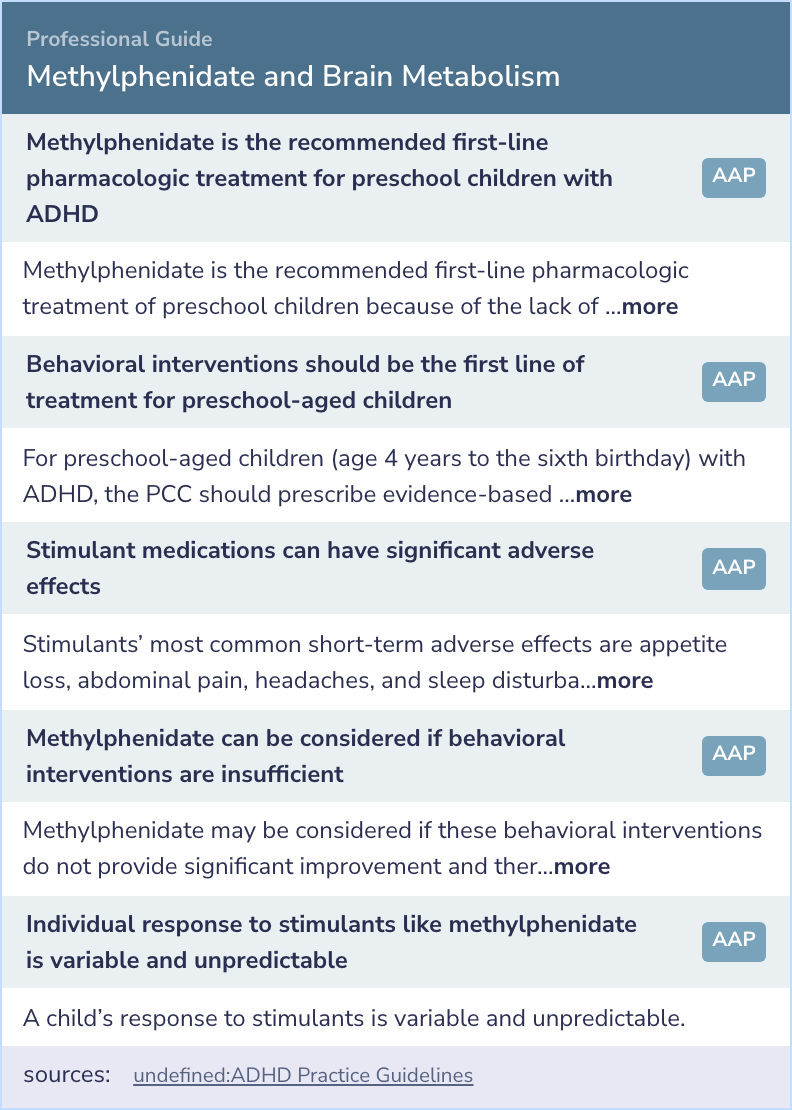
Evidence Summary
ADHD, Time Perception, and Stimulant Medication
Building upon how methylphenidate influences brain metabolism, researchers examined ADHD's effect on time perception.
They found that children with ADHD struggled to accurately reproduce time intervals, especially when distracted.
Interestingly, stimulant medication did not improve this ability, indicating that ADHD might disrupt time perception independently of medication.
They found that children with ADHD struggled to accurately reproduce time intervals, especially when distracted.
Interestingly, stimulant medication did not improve this ability, indicating that ADHD might disrupt time perception independently of medication.
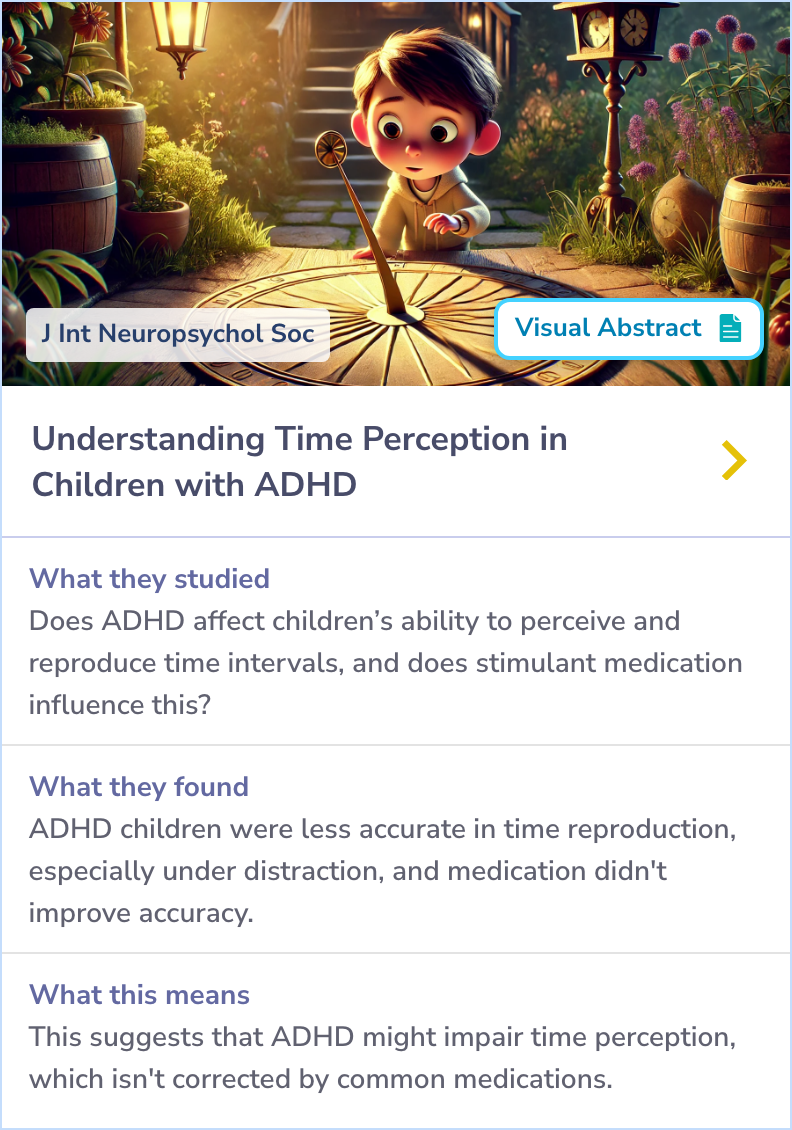
Evidence Summary
Impact of Physical Activity on ADHD Symptoms
Building upon variability in treatment responses observed in the paper, this study examines how physical activity impacts children with ADHD.
A 10-week structured exercise program significantly enhanced fitness, motor skills, and cognitive functions measured through standardized tests.
Parents and teachers also reported improved behavior and information processing.
These findings highlight the benefits of physical activity for children with ADHD.
A 10-week structured exercise program significantly enhanced fitness, motor skills, and cognitive functions measured through standardized tests.
Parents and teachers also reported improved behavior and information processing.
These findings highlight the benefits of physical activity for children with ADHD.
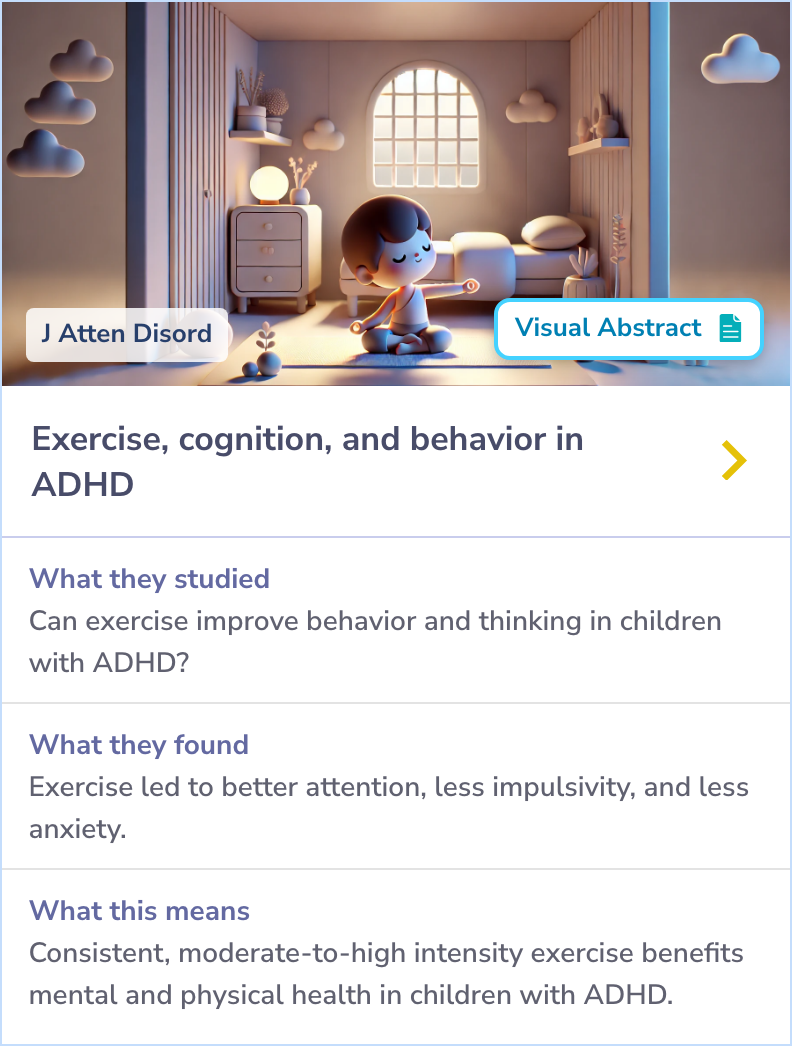
Evidence Summary
Organizational Strategies Improve ADHD Task Management
Building upon how methylphenidate affects brain metabolism, individuals with ADHD often face difficulties with response inhibition and sustained attention.
Research shows that employing organizational strategies and structured support can significantly enhance their ability to manage these challenges and improve academic performance.
These strategies directly address the cognitive hurdles linked to ADHD symptoms.
Research shows that employing organizational strategies and structured support can significantly enhance their ability to manage these challenges and improve academic performance.
These strategies directly address the cognitive hurdles linked to ADHD symptoms.
